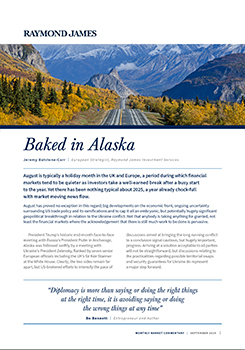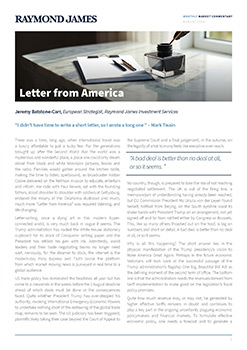The ECB met on Thursday, where it was widely anticipated they would maintain current interest rates. In the lead-up to the meeting, markets were grappling with several key questions; what does the political turmoil in France mean for the ECB? Is the ECB finished with its cutting cycle? And does the EU–US trade deal alter the economic outlook? All important questions — and ones that could shape the path ahead.
As expected, rates were left unchanged at the ECB’s meeting in Frankfurt, holding steady at 2.15%. President Christine Lagarde struck a positive tone, stating that inflation and the broader economy were broadly where the ECB wanted them to be. She acknowledged the challenges ahead; higher tariffs, set at 15% for EU countries, and a stronger euro are expected to weigh on growth for the remainder of the year. However, she predicted these headwinds could ease in 2026.
While often labelled either as a hawk or a dove, Ms Lagarde rejected both characterisations, preferring instead to be seen as an owl — with the ability to observe everything happening around her. Her focus will remain firmly on incoming data between now and the next meeting, with the integrity of European data notably praised at a time when the US and UK have faced challenges in this area.
We mentioned the French government’s turmoil at the start of this note, and to begin the week, Prime Minister François Bayrou lost a vote of confidence in parliament, with a resounding 364 votes against him and 194 in favour. Mr Bayrou becomes yet another casualty in a deeply fragmented French parliament, a legacy of President Macron’s snap parliamentary election in 2024. Just a day later, Macron appointed former Defence Minister Sébastien Lecornu as the new Prime Minister. Lecornu inherits the same challenges that plagued his predecessors; securing consensus on the budget and tackling a deficit that stands at nearly double the EU’s target of 3% of GDP.
On Sunday, Japan’s Prime Minister Shigeru Ishiba resigned, citing the need to take “responsibility” for a string of election defeats. His ruling coalition — the Liberal Democratic Party (LDP) and junior partner Komeito, lost its majority in both the lower and upper houses of parliament, marking the first time since 1955 that the LDP has lacked control of both chambers.
Ishiba’s final act in office was completing a landmark trade deal with US President Donald Trump, pledging $550 billion in Japanese investments in exchange for a reduction in tariffs to 15%. A successor will be chosen on the 4th of October, but uncertainty played its hand in this week’s sell off in Japanese Yen and record high yields in the 30-year bond. While the currency and bond markets weakened in Japan, the equity market continued to advance and made new all-time highs throughout the week. There is hope a new Prime Minister may implement pro-growth policies and further fiscal stimulus, while companies such as SoftBank have been strong performers due to their ties to AI infrastructure investments.
Midweek in the US, it was revealed that the economy created 911,000 fewer jobs over the past 12 months than previously estimated. This suggests the labour market has been far less resilient than portrayed, with job growth stalling well before the implementation of President Trump’s sweeping tariffs. The Producer Price Index (PPI) for August fell -0.1% month-on-month, a sharp reversal from July’s +0.7% rise. Despite ongoing trade uncertainty since the start of the year, the lack of strength in producer prices points to weak domestic demand.
US inflation rose in August to 2.9% year-on-year, up from the 2.7% level seen in June and July. Core inflation (excludes food and energy prices) remained steady at 3.1% for the second consecutive month, in line with market expectations. The US Federal Reserve is set to meet in exactly five days, and although it has refrained from cutting rates in 2025, investors are eagerly anticipating a 25bps (0.25%) rate cut, with the shift in policy stance confirmed by Fed Chair Jerome Powell at the Jackson Hole symposium last month. Unemployment data on Thursday was weaker than expected, with a higher number of initial jobless claims being recorded. This is likely to cement next week’s rate cut and there is a remote chance the US Fed could even cut by 0.5%. US equity markets reacted positively to the prospect of rate cuts, with the interest rate sensitive small cap index rallying close to 2% on Thursday. We saw the main US equity indices make new all-time highs on Thursday – it’s clear the old adage of “bad news is good news” is firmly in play for equity investors!
The mood in the UK has been bleak, marked by two high-profile Labour Party departures in the past week: Deputy Leader Angela Rayner and US Ambassador Peter Mandelson. Adding to the gloom, Britain’s GDP for July came in flat at 0% month-on-month, with the manufacturing sector posting the largest decline at -1.3%. While the economy performed better than expected in the first half of the year, the outlook for the second half remains decidedly pessimistic.
Stellar performers gold and silver continued to advance further this week, which has once again fed through to strong performance from the miners. Staying with miners, there was major M&A news this week with UK listed Anglo American agreeing a mining mega merger with Canadian rival Teck Resources. The deal will create a £40bn global copper group. Both companies have been the target of takeover bids recently and the merger should help protect against this. In a blow to the UK the head office for the new company will be in Canada, which could lead to job losses at Anglo’s London HQ.
It’s been a busy week, with equities advancing, while economic data is beginning to slow. Central banks will be watching data closely and there is now the expectation the US Fed will be cutting rates regularly as we head into 2026 to support the jobs market. Precious metals continue to be in high demand with both central banks and retail investors. Our portfolios have meaningful exposure to physical gold and precious metals miners and they have been major contributors to performance in 2025.
Nathan Amaning, Investment Analyst
Risk warning: With investing, your capital is at risk. The value of investments and the income from them can go down as well as up and you may not recover the amount of your initial investment. Certain investments carry a higher degree of risk than others and are, therefore, unsuitable for some investors.






